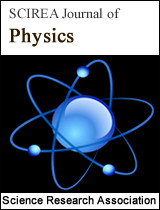Accurate expressions for optical coefficients, given in n(p)-type heavily (lightly) doped InAs-crystals at any temperature T, due to the impurity-size effect, and obtained from an improved Forouhi-Bloomer parameterization model (FB-PM)
DOI: 10.54647/physics140561 81 Downloads 6079 Views
Author(s)
Abstract
As given in Eq. (2) and Table 1, our analytical expression for the static dielectric constant, \varepsilon\left(r_{d\left(a\right)}\right), given in the n(p)-type InAs crystal, expressed as a function of the donor (acceptor) radius, r_{d\left(a\right)}, and determined from an effective Bohr model, decreases with increasing r_{d\left(a\right)}. It strongly affects the critical d(a)-density in the metal-insulator transition (MIT) at the temperature T (=0K), N_{CDn(CDp)}(r_{d(a)}), determined in Eq. (3), and all the expressions for optical coefficients, determined in Equations (24, 25, 28, 29) for the n(p)-type heavily (lightly) doped InAs semiconductors at any T. In particular, in the P-InAs system at T=0K, Table 3c shows that our obtained results for those optical coefficients are found to be more accurate than the corresponding ones, obtained from the FB-PM [11], suggesting that the present model, used here to study the optical properties of the n(p)-type heavily (lightly) doped InSb -crystal at any T, could be a good improved FB-PM.
Keywords
Effects of the impurity-size and heavy doping; effective autocorrelation function for potential fluctuations; optical coefficients; critical photon energy
Cite this paper
H. Van Cong,
Accurate expressions for optical coefficients, given in n(p)-type heavily (lightly) doped InAs-crystals at any temperature T, due to the impurity-size effect, and obtained from an improved Forouhi-Bloomer parameterization model (FB-PM)
, SCIREA Journal of Physics.
Volume 8, Issue 4, August 2023 | PP. 306-331.
10.54647/physics140561
References
| [ 1 ] | H. Van Cong, “New dielectric constant, due to the impurity size effect, and determined by an effective Bohr model, affecting strongly the Mott criterion in the metal-insulator transition and the optical band gap in degenerate (Si, GaAs, InP)-semiconductors, “SCIREA J. Phys., vol.7, pp. 221-234 (2022). |
| [ 2 ] | H. Van Cong, “ Same maximum figure of merit ZT(=1), due to effects of impurity size and heavy doping, obtained in the n(p)-type degenerate InP-crystal (), at same reduced Fermi energy and same minimum (maximum) Seebeck coefficient , at which same, “SCIREA J. Phys., vol.8, pp. 91-114 (2023). |
| [ 3 ] | H. Van Cong, “Effects of donor size and heavy doping on optical, electrical and thermoelectric properties of various degenerate donor-silicon systems at low temperatures,” American Journal of Modern Physics, vol. 7, pp. 136-165 (2018); “Accurate expressions for optical coefficients, due to the impurity-size effect, and obtained in n(p)-type degenerate Si crystals, taking into account their correct asymptotic behavior, as the photon energy E (),” SCIREA J. Phys., vol.8, pp. 172-197 (2023). |
| [ 4 ] | H. Van Cong et al., “A simple accurate expression of the reduced Fermi energy for any reduced carrier density. J. Appl. Phys., vol. 73, pp. 1545-15463, 1993; H. Van Cong and B. Doan Khanh, “Simple accurate general expression of the Fermi-Dirac integral and for j> -1,” Solid-State Electron., vol. 35, pp. 949-951(1992); H. Van Cong, “New series representation of Fermi-Dirac integral for arbitrary j> -1, and its effect on for integer j,” Solid-State Electron., vol. 34, pp. 489-492 (1991). |
| [ 5 ] | C. Kittel, “Introduction to Solid State Physics, pp. 84-100. Wiley, New York (1976); S. A. Obukhov et al., “Anomalous magnetic and transport properties of InSb (Mn) crystals near metal-insulator transitions,” AIP Advances, vol. 8, 105214 (2018). |
| [ 6 ] | M. A. Green, “Intrinsic concentration, effective density of states, and effective mass in silicon,” J. Appl. Phys., vol. 67, 2944-2954 (1990). |
| [ 7 ] | H. Van Cong et al., “Optical bandgap in various impurity-Si systems from the metal-insulator transition study,” Physica B, vol. 436, pp. 130-139, 2014; H. Stupp et al., Phys. Rev. Lett., vol. 71, p. 2634 (1993); P. Dai et al., Phys. Rev. B, vol. 45, p. 3984 (1992). |
| [ 8 ] | J. Wagner and J. A. del Alamo, J. Appl. Phys., vol. 63, 425-429 (1988). |
| [ 9 ] | D. E. Aspnes, A. A. Studna, “Dielectric functions and optical parameters of Si, Se, GaP, GaAs, GaSb, InP, InAs, and InSb from 1.5 to 6.0 eV”, Phys. Rev. B, vol. 27, 985-1009 (1983). |
| [ 10 ] | L. Ding, et al., “Optical properties of silicon nanocrystals embedded in a matrix”, Phys. Rev. B, vol. 72, 125419 (2005). |
| [ 11 ] | A. R. Forouhi, I. Bloomer, “Optical properties of crystalline semiconductors and dielectrics”, Phys. Rev., vol. 38, 1865-1874 (1988). |
| [ 12 ] | G. E. Jr. Jellison, F. A. Modine, “Parameterization of the optical functions of amorphous materials in the inter-band region”, Appl. Phys. Lett., vol. 69, 371-373 (1996) |

